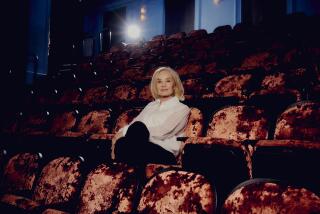Guitarist Julian Lage finds ‘the common denominator’
Ambitious adolescent actors looking to nurture their creativity over the long run rather than chasing flickers of tabloid fame could do a lot worse than to follow the path blazed by Julian Lage.
Before his age reached double digits, the precociously talented guitarist had won the admiration of illustrious musicians and starred in Mark Becker’s award-winning documentary “Jules at Eight.” By his midteens, several record labels had come courting, but Lage decided to continue studying jazz, bluegrass and Hindustani classical music when he wasn’t touring with vibraphone master Gary Burton.
After earning an accelerated degree at Berklee College of Music, Lage finally recorded his debut CD at the ripe old age of 20, resulting in 2009’s stylistically expansive “Sounding Point,” which earned a Grammy Award nomination for best contemporary jazz album. He doesn’t regret taking his time.
“I did have four or five offers to make an album before ‘Sounding Point,’” says Lage, speaking from his apartment on Manhattan’s Upper West Side. “But I wanted to debut with a full-fledged statement, a la Bela Fleck, Gary Burton and David Grisman. They had their stuff together.”
Now 23, Lage has established himself as one of jazz’s most adventurous young bandleaders, though his music owes as much to folk and classical sources as to jazz. He opens a two-night run at Catalina Bar & Grill on Monday as part of a tour celebrating the release of his second CD, “Gladwell” (EmArcy), with his quintet featuring Brooklyn saxophonist Dan Blake, Venezuelan-born Boston Philharmonic cellist Aristides Rivas, Peruvian bassist Jorge Roeder and Colombian percussionist Tupac Mantilla.
While the band possesses the dynamic control and textural resources of a chamber ensemble, Lage has honed a singular group sound by building intricate arrangements around relatively simple melodies.
“We’re always striving to not read music on stage, to learn the music by heart,” says Roeder, who also performs widely with the luminous Argentine vocalist Sofia Rei Koutsovitis. “That’s been one of the most liberating things for me. Having a group where everyone is collaborating on the compositions really let me devour the music and make it part of myself.”
Rather than using the guitarist’s themes as launching pads for extended improvisation, the group constantly trades roles while developing countermelodies and interlocking rhythms, blurring the distinction between soloist and accompanist. Most striking is the way Lage avoids the pitfalls of eclectic pastiche, seamlessly assimilating various styles into a persuasively coherent, distilled essence.
“I grew up with jazz and hearing a lot of bluegrass and Americana music, and I love the improvisational aspect of those traditions,” Lage says. “In old-time music every variation of a fiddle tune is very different, and it’s the same in classical Indian music. You become the common denominator who connects all these styles. You take what you love and you leave the rest.”
Raised in Santa Rosa, Lage started attracting attention on the Bay Area music scene when he was so small he almost looked comical holding a guitar. He made his recording duet on mandolin master David Grisman’s 1999 CD “Dawg Duos” (Acoustic Music). Only 11 at the time, Lage sounded preternaturally self-possessed trading licks with Grisman on their co-composed piece “Old Souls.”
After Lage’s brush with fame in the documentary “Jules at Eight,” perhaps it’s not surprising that the encounter that ignited his career could have been pulled straight out of a Hollywood drama. Selected to perform as part of a youth all-star big band for the 2001 Grammy Awards, Lage made such a vivid impression with a brief solo that Gary Burton made a point of finding out his name.
When asked to pull together a musical presentation for the Technology Entertainment and Design (TED) Conference in Monterey a few months later, Burton tracked down the sixth-grader and arranged an appearance with his parents. Lage handled the date like a seasoned pro, trading solos on the bebop anthem “A Night in Tunisia” with Herbie Hancock, a regular TED attendee. Burton stayed in touch with Lage for several years and eventually created the Generations Band to feature the teenage guitarist, while hoping he didn’t follow the trajectory of so many other preternaturally advanced young musicians.
“Frequently you’ll come across young prodigies, say a kid who plays piano incredibly for his age, and in most cases 10 years later we wonder where they are,” Burton says. “I was a child prodigy myself so I understand the dynamic.”
After a three-year hiatus during Lage’s studies at Berklee, the vibraphonist reconnected with Lage when he recruited him for the New Gary Burton Quartet. Instead of a showcase for emerging players like Generations, the New Quartet pairs Lage with two of jazz’s most powerful and sought-after accompanists, bassist Scott Colley and drummer Antonio Sanchez. He’s also performing widely with fiddle star Mark O’Connor’s Hot Swing Trio and drum maestro Eric Harland’s band. Whether working as a sideman or leading his quintet, Lage has arrived as a major new voice.
“If you play any instrument, but especially guitar and piano, you have to have an identifiable sound and style in order to stand out,” Burton says. “I’m proud to say that Julian has really developed his own character and sound. He’s got a way of pulling and bending strings when he plays intense phrases that reminds me a little of Gypsy guitar style he admired as a kid. And in his own band, he’s got an acoustic-electric mix I don’t hear with any other band playing.”
More to Read
The biggest entertainment stories
Get our big stories about Hollywood, film, television, music, arts, culture and more right in your inbox as soon as they publish.
You may occasionally receive promotional content from the Los Angeles Times.










